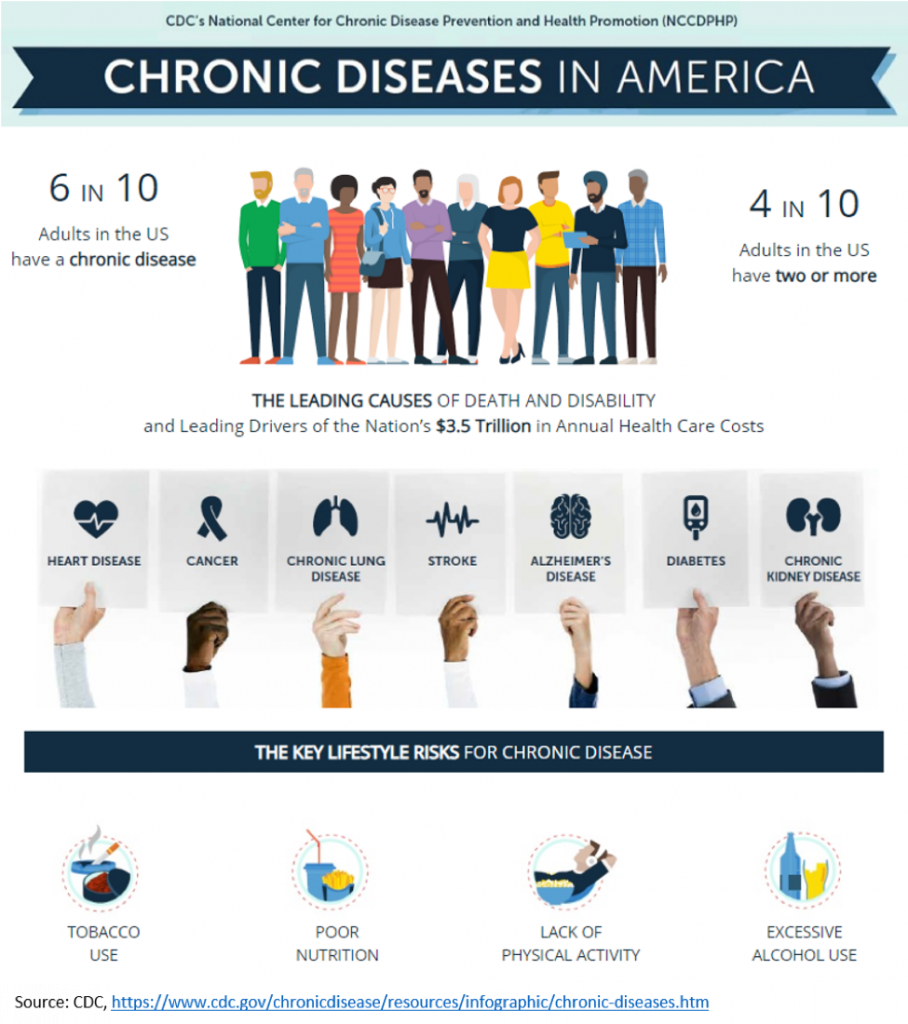The Blog
How to Prevent Chronic Illness with Small Lifestyle Changes
 How do you want to live? Perhaps, you long to play with your children or grandchildren without getting winded. Maybe you hope to enjoy activities like biking, gardening, swimming, or hiking or simply want to feel energized throughout your day.
How do you want to live? Perhaps, you long to play with your children or grandchildren without getting winded. Maybe you hope to enjoy activities like biking, gardening, swimming, or hiking or simply want to feel energized throughout your day.
Unfortunately, 6 in 10 American adults struggle with chronic illnesses like obesity, heart disease, and type 2 diabetes, making these everyday activities difficult. Living with chronic conditions can zap you of your energy and make everyday tasks more difficult. You also may have to manage multiple medications, which can influence what foods you can, or can’t, eat. These patterns also can impact your mood, mindset, and emotional health.
You can’t prevent all chronic illnesses or medical conditions. For instance, epilepsy, multiple sclerosis, Parkinson’s disease, and dementia can be caused by factors that you can’t control, such as genetics, age, or family history. That said, incorporating healthy lifestyle habits can help people manage, prevent, or slow aspects of chronic diseases and medical conditions regardless of whether they are preventable or not.
Healthy Lifestyle Habits That Can Help You Manage or Prevent Chronic Illnesses
You know the basics of a healthy lifestyle—eat nutritious foods, don’t smoke, exercise, maintain a healthy weight, limit your alcohol, and get quality sleep. Yet making and maintaining these lifestyle changes can feel overwhelming. How do you make all these changes when life is already so busy?
Fortunately, you don’t have to change everything at once. Start with small manageable steps. As you incorporate and master these new healthier habits, you’ll be able to add new ones.
Even though this approach can take a little more time, you will build confidence in your abilities, minimize feeling overwhelmed, and turn the new habits into lasting lifestyle routines. Your success will help you on your journey as you incorporate other healthy changes.
Here are some strategies to help you start incorporating healthy lifestyle habits to help you prevent or manage chronic illnesses. As you look through the suggestions, start by selecting one small change that you feel you can successfully incorporate.
Eating a variety of nutrients and reducing sodium can help you prevent or manage chronic illnesses
What you eat directly affects your health. If your diet mainly consists of foods low in essential nutrients or chronically undereating, your body can’t function or perform optimally. These situations can put a strain on different systems in your body, like your circulatory system and heart. Additionally, eating too much food can lead to obesity, which increases your risk of chronic illnesses like heart problems and type 2 diabetes.
Research also has shown that not getting enough or getting too much of certain nutrients can substantially increase your risk of dying from stroke, heart disease, and type 2 diabetes. One study using data from the Centers for Disease Control and Prevention found that 45 percent of deaths from these three illnesses in 2012 was associated with dietary factors. Of the ten dietary factors investigated, the results suggested that reducing sodium intake and the amount of processed meats were critical factors. Additionally, increasing the amount of nuts, seeds, and omega-3 fatty acids was important.
Small steps you can take to eat healthier include:
- Reducing how much salt you add to foods
- Cutting back gradually on how frequently you eat high-sodium foods
- Limiting how much processed meat you eat each week
- Adding more nuts and seeds to your diet
- Eating more seafood that is high in omega-3 fatty acids or add a supplement
- Reducing the amount of sugar you add to your drinks and foods
- Cutting back or no longer drinking sugary beverages like sodas, sweet tea, and energy drinks
- Adding in one additional serving of a vegetable or fruit at each meal
Aim for moderately vigorous exercise each week and sit less throughout the day
You know you need to exercise regularly to help your health, but physical activity also provides immediate benefits. Physical activity of all kinds helps your mood, relieves stress, boosts your focus, and helps you sleep better.
Ideally, adults should aim for at least 150 minutes of moderately vigorous exercise each week. Moderate exercise includes activities like a brisk walk, swimming, bicycling, gardening, or playing a sport. You can spread out your physical activity throughout the week in amounts that fit your schedule. For instance, even short bouts of activity, like 10 minutes of exercise at a time, can benefit your health. Finding activities you enjoy and varying what you do can help keep it fun and engaging.
Another critical element is to limit how much you sit throughout the day. Studies indicate that sitting for long periods increases your risk of certain chronic conditions, like type 2 diabetes, heart disease, and obesity, even if you get regular physical activity.
Small steps you can take to incorporate more physical activity each day include:
- Getting up from sitting every hour to move around or stretch for a few minutes
- Creating a habit of going on a brisk walk after one meal each day (pick the meal that lets you build a consistent habit)
- Stretching gently a few minutes after getting up for the day
- Scheduling one 10 minute block of exercise each day
- Exercising regularly with a friend or family member
Get regular, quality sleep every night to reduce your risk of preventable chronic diseases
You know sleep is important, but it can often seem like a luxury. Sleeping less is often one of the first things adults cut back on in attempts to complete all their day’s tasks.
One-third of American adults don’t regularly get at least seven hours of sleep a night. Chronic sleep deprivation can impact your alertness, mood, short-term memory, and your health. Adults who regularly get less than seven hours of sleep a night are more likely to be obese, less physically active, smoke cigarettes, and have a chronic illness, such as obesity, type 2 diabetes, and heart disease.
Fortunately, getting more regular sleep can help improve how you feel and help you manage or reduce the impact of some chronic illnesses. For instance, getting enough quality sleep may help improve blood sugar control in people with type 2 diabetes. If you think a medical condition, chronic pain, or potential sleep disorder are interfering with the quality of your sleep, discuss your concerns with your doctor.
Small steps you can make to get regular, quality sleep include:
- Setting a specific bedtime that allows you to get at least seven hours of sleep each night
- Establishing a sleep routine that starts at least 30 minutes before your bedtime to help you begin winding down for the day and creating signals for your body that you will be sleeping soon
- Avoiding electronic devices at least 30 minutes before going to bed
- Reading a book or an e-reader that doesn’t emit blue light to help wind down and relax instead of an electronic device
- Avoid caffeine late in the day
 Small, Healthy Lifestyle Changes Can Help You Prevent or Reduce Chronic Illnesses
Small, Healthy Lifestyle Changes Can Help You Prevent or Reduce Chronic Illnesses
You know eating nutritious foods, sleeping regularly, and exercising are three critical components of a healthy lifestyle. Incorporating healthy habits and routines can help prevent chronic illnesses and even slow or reduce these illnesses’ impact. However, it can feel daunting and overwhelming to incorporate these new habits and skills, especially when life keeps you busy.
Fortunately, making small changes gradually can contribute to improved health and move you toward the healthy lifestyle you desire.
